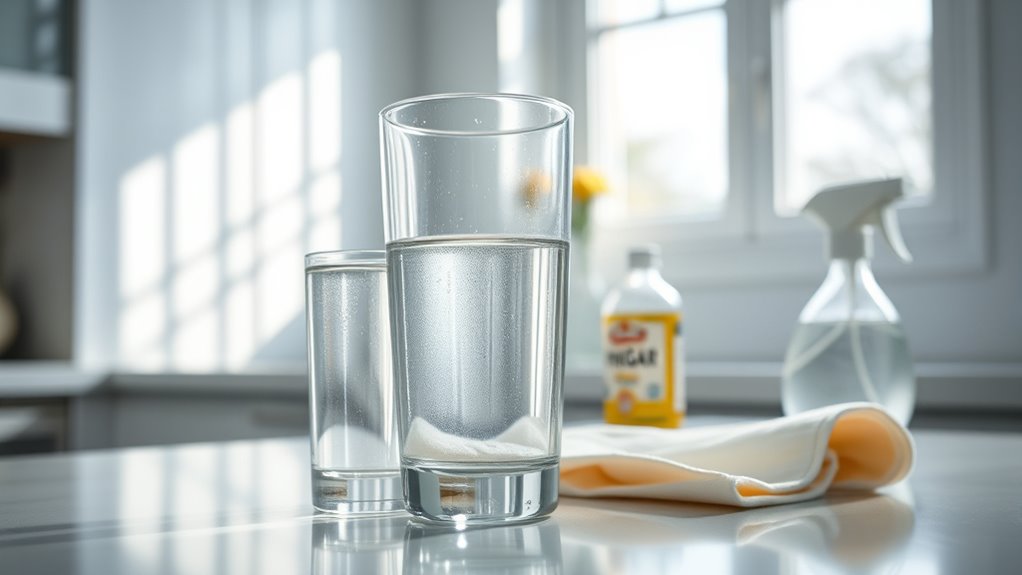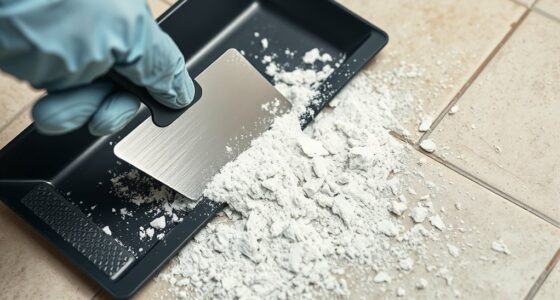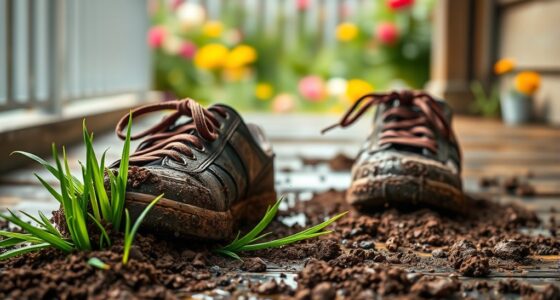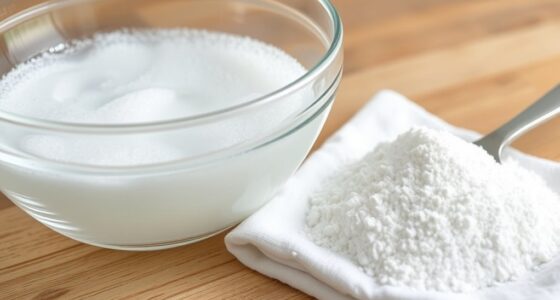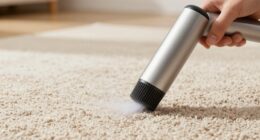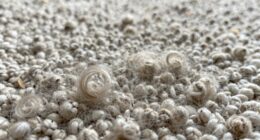To get rid of hard water stains on glassware, mix equal parts vinegar and water in a spray bottle. Spray the solution on the stains, let it sit for a few minutes, then scrub with a soft brush. For tougher spots, use a baking soda paste. Rinse well with distilled water to avoid residue. To prevent future stains, wipe glassware dry and consider installing a water softener. Learn more strategies to keep your glass shiny and clear.
Key Takeaways
- Soak glassware in a vinegar solution (equal parts vinegar and water) to dissolve hard water stains effectively.
- Apply a baking soda paste to tough spots, let it sit, then scrub gently for better results.
- Use microfiber cloths for drying and polishing to avoid scratching and to enhance clarity.
- Rinse glassware with distilled water to prevent mineral residue from hard water.
- Regularly clean glassware immediately after use to prevent future stain buildup.
Understanding Hard Water Stains
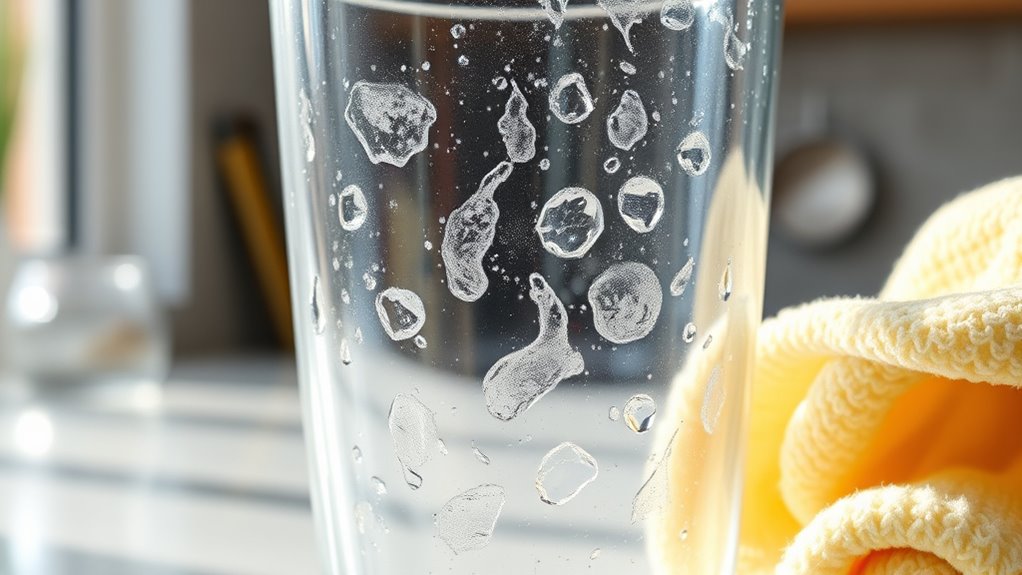
Hard water stains can be a frustrating nuisance, leaving behind unsightly mineral deposits on your surfaces. These stains form when water evaporates, leaving behind minerals like calcium and magnesium. You’ll often notice them on glassware, shower doors, windows, and faucets, appearing as white or cloudy spots that dull the shine of your items. If left untreated, these deposits can etch or weaken glass over time, leading to even bigger problems. Visually, you might see chalky spots or a cloudy appearance, indicating persistent residue buildup. Cleaning can be a challenge, as these stains resist ordinary methods. Plus, hard water can lower the efficiency and lifespan of your appliances, making it essential to understand and address this issue effectively. Installing a water softener can significantly reduce the mineral buildup that leads to these stains.
Effective Methods for Removing Stains
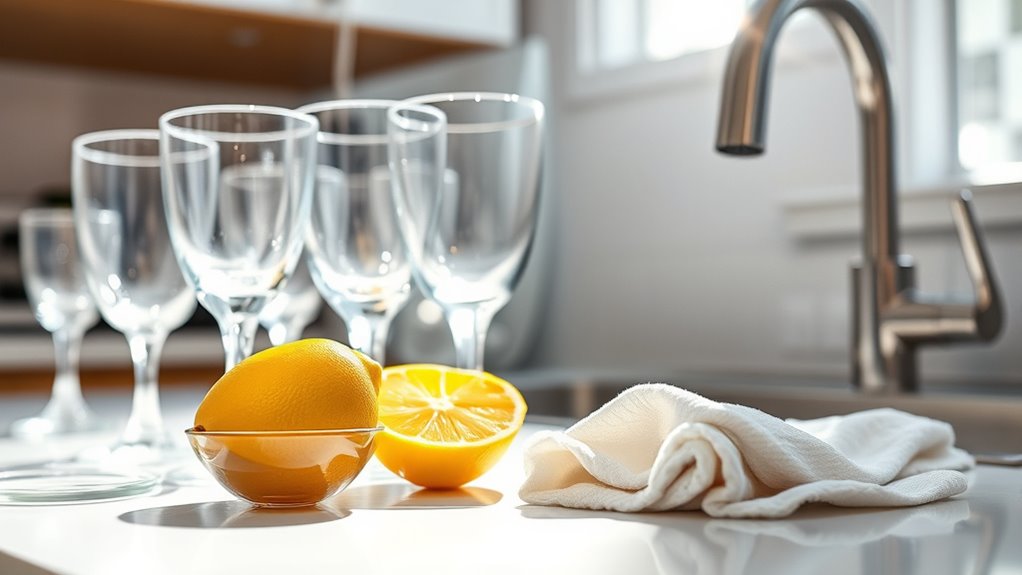
To tackle those stubborn hard water stains, several effective methods can help restore the shine to your surfaces.
Start by creating a vinegar solution with equal parts white vinegar and water. Soak your glassware in this mixture for a few hours or spray it directly onto the stains for targeted cleaning.
For tougher spots, a baking soda paste can work wonders; just mix it with water, apply it to the stains, and let it sit before scrubbing gently. Regular use of a water softener can also help prevent these stains from forming in the first place.
You can also try using Bar Keepers Friend or even lemon juice combined with baking soda for a gentle clean.
Regular maintenance with these methods will keep your glassware looking crystal clear and prevent future stains from forming.
Essential Tools for Cleaning Glassware
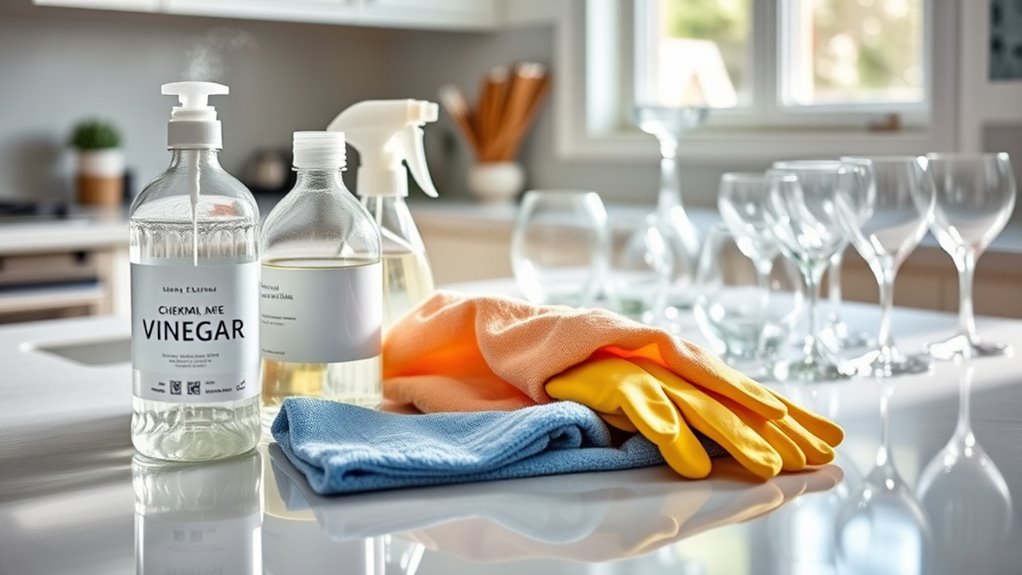
Cleaning glassware effectively requires the right tools to achieve sparkling results. Start with brushes featuring wooden or plastic handles to avoid scratching. You’ll need various sizes, especially long-bristled bottle brushes for reaching narrow necks. For larger quantities, motor-driven revolving brushes can save time. Stock up on basic cleaning supplies like soap, Alconox, or mild abrasives that won’t harm glass. Use microfiber polishing cloths for drying and polishing, and non-scratch sponges for gentle scrubbing. A vinegar solution in a spray bottle can help tackle tough stains directly. Additionally, it’s important to use distilled water for final rinsing to ensure that no cleaning agents remain on the glassware. Finally, make certain you have drying racks and squeegees to eliminate water spots and excess moisture efficiently. With these tools, you’re set for a successful cleaning session!
Tips for Preventing Future Stains
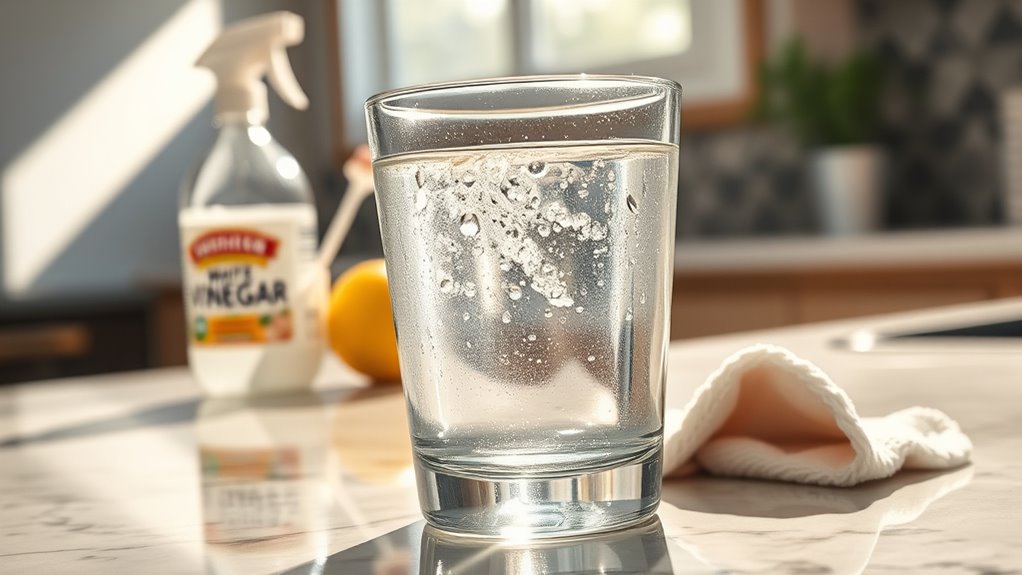
Although it might seem difficult to keep glassware free from stains, adopting a few simple habits can make a significant difference.
Start by cleaning your glassware immediately after use to prevent mineral buildup. Daily maintenance practices, like wiping down surfaces with a dry microfiber cloth, will help keep stains at bay. Additionally, using a squeegee after each shower can be an effective technique to prevent hard water stains on glass surfaces in the bathroom, which can also apply to glassware.
Consider installing a water softener to reduce calcium and magnesium deposits in your water. Applying protective coatings, such as Envicoat or Enduroshield, creates a barrier against stains.
Incorporate cleaning solutions like vinegar and water for regular upkeep, and use lemon juice or baking soda for tougher spots.
Finally, establish a cleaning routine to guarantee your glassware remains clear and sparkling over time.
Common Issues Related to Hard Water Stains
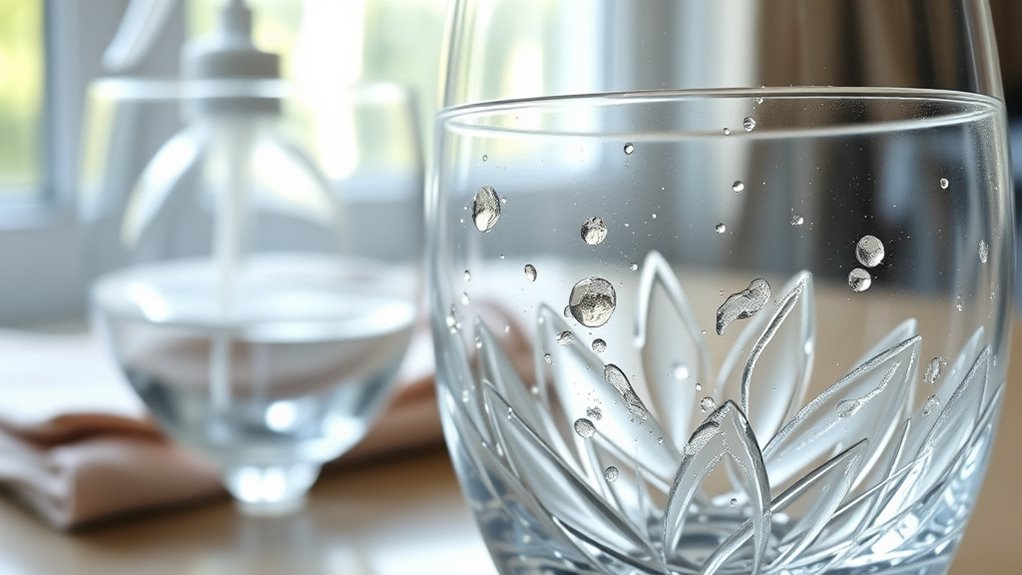
Even with preventative measures in place, hard water stains can still be a persistent issue. These stains, caused by high levels of calcium and magnesium in hard water, leave cloudy spots on your glassware that can etch the surface if neglected. You may find that these mineral deposits bond strongly, making them tough to remove. Over time, ignoring hard water stains not only dulls your glassware but can also affect other surfaces like shower doors and windows. Additionally, hard water can lead to skin irritation and affect your hair, while also contributing to soap scum buildup. The economic burden of cleaning solutions and potential appliance damage adds to the frustration of dealing with hard water stains. Installing a water softening system can significantly reduce the occurrence of these stains. Furthermore, using air purifiers can help improve overall air quality, which may indirectly reduce the frequency of hard water stains by minimizing dust and other airborne particles.
Additional Cleaning Solutions to Consider
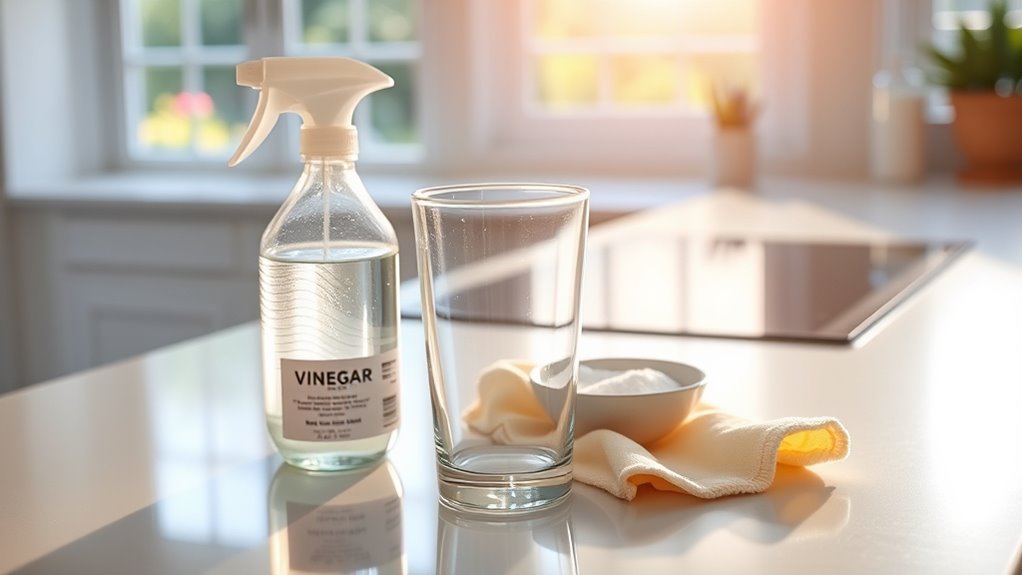
When tackling hard water stains, you have a variety of effective solutions at your disposal. A vinegar solution, mixing equal parts vinegar and water, works wonders in dissolving mineral deposits. Additionally, using a water softener can help reduce the occurrence of hard water stains by removing calcium and magnesium ions from your water supply.
If you prefer something more abrasive, a baking soda paste can gently lift stains without scratching your glassware. For a natural approach, lemon juice offers acidity similar to vinegar. Commercially, products like CLR and Lime-A-Way target severe buildup effectively. You might also consider using a Mr. Clean Magic Eraser or a non-scratch sponge for stubborn stains.
To finish, microfiber cloths are perfect for polishing your glass and preventing new stains. By exploring these options, you’ll easily restore your glassware’s shine.
Frequently Asked Questions
Can Hard Water Stains Be Harmful to Health?
Hard water stains aren’t harmful to your health; they mainly affect your home’s appearance. The minerals causing these stains, like calcium and magnesium, are actually good for you when consumed.
However, you might notice your skin feels dry or your hair becomes frizzy because soap doesn’t work as well in hard water. While it doesn’t pose health risks, the aesthetic issues can be frustrating, so you might want to contemplate solutions for your household.
How Often Should I Clean My Glassware for Best Results?
You should clean your glassware at least once a week for the best results.
Regular maintenance helps maintain clarity and prevents dirt from weakening the glass over time. If you notice any buildup or stains, don’t wait; tackle it immediately to avoid deeper issues.
Keeping up with this routine not only enhances the aesthetic appeal but also extends the lifespan of your glassware, saving you money in the long run.
Will Boiling Water Help Remove Hard Water Stains?
Think of boiling water as a gentle wave crashing against stubborn rocks—it’s got the force, but it won’t budge those mineral deposits.
Unfortunately, boiling water won’t effectively remove hard water stains. Instead, try using vinegar or baking soda for a more powerful impact.
These options can break down those tough stains when combined with a little scrubbing. So, grab your cleaning supplies and get ready to tackle those pesky spots!
Are There Specific Brands of Vinegar Better for Cleaning?
When it comes to cleaning with vinegar, specific brands might catch your eye, but the type of vinegar is what really matters.
Both distilled malt and white vinegar are highly effective due to their acidity. You’ll find that personal preference plays a role, but generally, any quality vinegar will do the job.
Just remember, it’s the acetic acid that dissolves mineral deposits, so focus on that rather than brand names.
Can Hard Water Stains Be Removed From Other Surfaces?
Yes, you can remove hard water stains from various surfaces.
For metal fixtures, try using CLR or a vinegar soak.
On ceramic and tile, a baking soda paste works wonders.
You might also find that OxiClean Foam-Tastic is effective for larger areas.
Don’t forget to maintain these surfaces regularly with vinegar or baking soda to prevent future stains.
Using a water softener can also help reduce mineral buildup over time.
Conclusion
Now that you know how to tackle those pesky hard water stains, you can enjoy sparkling glassware that shines like a thousand diamonds. By using the right methods and tools, you’ll keep your glasses looking pristine and prevent future stains from sneaking in. Remember, a little maintenance goes a long way! So, grab your cleaning supplies and show those stains who’s boss—your glassware deserves to dazzle!
